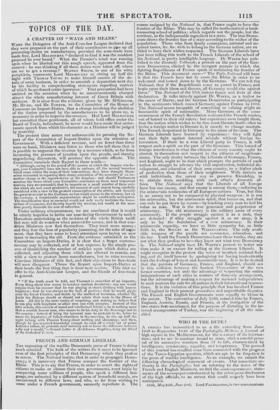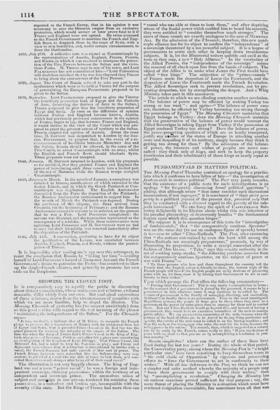WHO IS THE DUPE?
A FRIEND has transmitted to us a file extending front June 1839 to September 18-10 of the Purtef;e,,/io .3.1;t1tese, a journal of high repute in the Mediterranean, for the a. curacy of its informa- tion; and we are in candour bound to state, after a careful peru- sal of its successive numbers from 57 to 126, characterized by intelligence, consistency, sagacity, and temperance. The perusal of this journal has recalled sonic filets connected with the progress of the Turco-Egyptian question, which are apt to be forgotten in the press of warlike intelligence. As an example, we submit the tbllowing chronological statement of events. Our immediate au- thority is the Portofos,dio; but on referring to the notes of the French and English :Ministers, we find the contemporaneous state- ments of the newspaper corroborated by the subsequent disclosures of the high officials, to an extent that could sca‘cely have been anticipated.
ISA .May 25th, June 201h. Lord PALMERSTON, in two conversations
repeated to the French Envoy, that in his opinion it was necessary to save the Ottoman empire from an exclusive protection, which would sooner or later prove fatal to it if France and England were not agreed. He twice proposed to the French Government to combine the French and Eng- lish fleets, to despatch them to. the coast of Syria, with a view to stop hostilities, and, under certain circumstances, to force the Dardanelles.
1839, July 27M, A collective note was signed at Constantinople by the representatives of Austria, England, France, Prussia, and Russia, in which it was resolved to interpose the protec- tion of the Five Powers between the Sultan and the victo- rious Pasha. M. TRIERS says in one of his notes, and Lord PALMERSTON has not contradicted him—" Lord Palmerston will doubtless recollect that he was less disposed than France to bring about the concurrence of the Five Powers."
1839, August. The Court of Russia refused to take any part in the conferences which were to be held at Vienna for the purpose of generalizing the European Protectorate proposed to be given to the Sultan.
1839, September. Lord PALMERSTON proposed to give the Viceroy the hereditary possession both of Egypt and the Pashalic of Acre, (reserving the fortress of Acre to the Sultan.) France proposed to give hint the hereditary possession of Egypt and Syria. As soon as the difference of opinion between France and England became known, Austria, which had previously professed concurrence in the opinion of France, began to say, that between France and England, it would incline to the view of the Court which was pre- pared to grant the greatest extent of territory to the Sultan. Prussia adopted the opinion of Austria. About the same time, M. Ilauxow was despatched to London by the Rus- sian Government, to propose that, in the event of a re- commeecement of hostilities between MEHEMET ALI and the Sultan, Russia should be allowed, in the name of the Five Courts, to cover Constantinople with an army, whilst the English and French fleets should blockade Syria. These proposals were not accepted.
1840, January. M. BRUNOW returned to London, with his proposals so far modified, that they granted France and England the power of introducing each three vessels into a limited part of the sea of Marmora while the Russian troops occupied
• Constantinople.
1840, eralliVity to March. In the month of January, a conspiracy was detected in Greece, ramifications of which extended to the Ionian Islands, and in which the Greek Patriarch at Con- stantinople was implicated. The English Ambassador demanded from the Porte the deposition of the Patriarch : the Russian Ambassador endeavoured to support hint. In the month of March the Patriarch was deposed. During the pendency of this dispute, Mr. BELL arrived from Circassia, (in the beginning of February): and the Russian Ambassador caused his servant to be arrested, on the pretext that he was a Pole. Lord PONSONBV complained: the servant was liberated, and the transaction represented as the consequence of a mistake. While these controversies were agitating, Lord PONSONEV and M. BOUTINIEFF were on bad terms ; but their friendship was renewed immediately after the deposition of the Patriarch.
1840, July 15th. A convention, professing to have for its object the pacification of the Levant, was concluded between Austria, England, Prussia, and Russia, without the partici- pation of France.
It is impossible, alter casting one's eye over this retrospect, to resist the conclusion that Russia, by " biding her time "—availing herself or Lord PONSONIII'S hatred of :MEHEMET A la and the French Government's desire to patronize the Pasha—has contrived to blow up the Anglo-French alliance, and generally to promote her own ends on the Bosphorus.



























 Previous page
Previous page